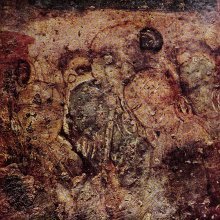Kirtivarman, Kīrtivarman, Kirti-varman: 5 definitions
Introduction:
Kirtivarman means something in Hinduism, Sanskrit, the history of ancient India. If you want to know the exact meaning, history, etymology or English translation of this term then check out the descriptions on this page. Add your comment or reference to a book if you want to contribute to this summary article.
Images (photo gallery)
In Hinduism
Kavya (poetry)
Source: Wisdom Library: KathāsaritsāgaraKirtivarman (किर्तिवर्मन्) is the name of a warrior (sainya) in service of king Vikramāditya from Ujjayinī, according to the Kathāsaritsāgara, chapter 121. Accordingly, “... and the following speeches of the military officers, assigning elephants and horses, were heard in the neighbourhood of the city [Ujjayinī] when the kings started, and within the city itself when the sovereign started: ‘[...] and Kirtivarman [must take] the black Konkan mare Kuvalayamālā...’”.
The Kathāsaritsāgara (‘ocean of streams of story’), mentioning Kirtivarman, is a famous Sanskrit epic story revolving around prince Naravāhanadatta and his quest to become the emperor of the vidyādharas (celestial beings). The work is said to have been an adaptation of Guṇāḍhya’s Bṛhatkathā consisting of 100,000 verses, which in turn is part of a larger work containing 700,000 verses.

Kavya (काव्य, kavya) refers to Sanskrit poetry, a popular ancient Indian tradition of literature. There have been many Sanskrit poets over the ages, hailing from ancient India and beyond. This topic includes mahakavya, or ‘epic poetry’ and natya, or ‘dramatic poetry’.
India history and geography
Source: Archaeological Survey of India: Śaiva monuments at PaṭṭadakalKīrtivarman (कीर्तिवर्मन्) is one of the two sons of Pulakeśin I, the other being Maṅgaleśa. On Pulakeśin’s death Kīrtivarman came to the throne (566-96). Nothing much is known about his rule except that he maintained the kingdom in peaceful ambiance and harmony. His son, the future Pulikeśin II was too young to hold the reins of the empire at the time of his father\'s death. So Kīrtivarman requested Maṅgaleśa to look after the kingdom till his son come of age. Maṅgaleśa (596-609) shouldered the burden of the kingdom but later became ambitious. He became so ambitious that he wished to have the throne for his own son.

The history of India traces the identification of countries, villages, towns and other regions of India, as well as mythology, zoology, royal dynasties, rulers, tribes, local festivities and traditions and regional languages. Ancient India enjoyed religious freedom and encourages the path of Dharma, a concept common to Buddhism, Hinduism, and Jainism.
Languages of India and abroad
Sanskrit dictionary
Source: Cologne Digital Sanskrit Dictionaries: Monier-Williams Sanskrit-English DictionaryKīrtivarman (कीर्तिवर्मन्):—[=kīrti-varman] [from kīrti > kīrt] m. Name of a prince, [Prabodha-candrodaya]
[Sanskrit to German]
Sanskrit, also spelled संस्कृतम् (saṃskṛtam), is an ancient language of India commonly seen as the grandmother of the Indo-European language family (even English!). Closely allied with Prakrit and Pali, Sanskrit is more exhaustive in both grammar and terms and has the most extensive collection of literature in the world, greatly surpassing its sister-languages Greek and Latin.
See also (Relevant definitions)
Partial matches: Varman, Kirti.
Full-text: Mangalesha, Gopala, Durlabhadevi, Mahendravarman, Indukanti, Pulakeshin, Ghatta, Pandipura, Kancipura, Kuvalayamala, Vatapi.
Relevant text
Search found 8 books and stories containing Kirtivarman, Kīrtivarman, Kirti-varman, Kīrti-varman; (plurals include: Kirtivarmans, Kīrtivarmans, varmans). You can also click to the full overview containing English textual excerpts. Below are direct links for the most relevant articles:
The history of Andhra country (1000 AD - 1500 AD) (by Yashoda Devi)
Introduction (Velanandu Choda dynasty) < [Chapter I - The Velanandu Chodas of Tsandavole (A.D. 1020-1286)]
Matangalila and Hastyayurveda (study) (by Chandrima Das)
Airāvata (vehicle of the King of Gods—Indra) < [Chapter 4]
Depiction of elephants on the royal seals and inscription-slabs/plates < [Chapter 2]
Dasarupaka (critical study) (by Anuru Ranjan Mishra)
Part 13 - Status of Women in the Samudramanthana < [Chapter 6 - Samavakāra (critical study)]
Part 12 - Society in the Samudramanthana < [Chapter 6 - Samavakāra (critical study)]
Pallava period (Social and Cultural History) (by S. Krishnamurthy)
The Later or the Imperial Pallavas < [Chapter 1 - Introduction]
Durvinita and Vikramaditya I < [January, 1928]
Impact of Vedic Culture on Society (by Kaushik Acharya)
6. Sacrifices With Political Significance < [Chapter 2]
